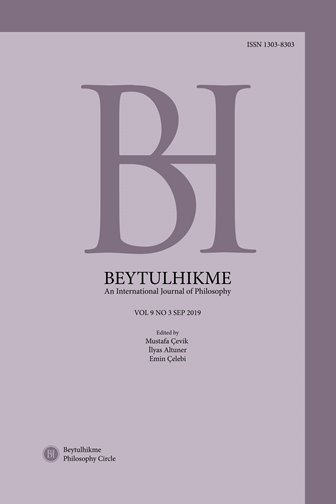Author :
Abstract
Bu makale, genel olarak sosyal bilimler ve özel olarak örgütsel bilimler için nicel ve nitel araştırma yöntemlerinin eleştirisini sunmayı amaçlamaktadır. Nicel ve nitel araştırma modelleri, yirminci yüzyılın ikinci yarısında hakim olmuştur. Bu arada, aralarındaki ikilemin metodolojik çoğulculuk haline getirilerek aşılması gerektiği giderek artan bir endişe haline gelmiştir. Pozitivizm, nicel metodolojinin epistemolojik temelidir, oysa fenomenoloji aynı şeyi nitel olarak yapar. Metodolojik çoğulculuk için, ne pozitivizm ne de fenomenolojinin tek başına yeterli olamayacağı iddia edilecektir. Bu makale, temel varsayımlarını hesaplamak amacıyla hem pozitivizm hem de fenomenolojinin bir karşılaştırmasını ve analizini sunmaktadır. Bu araştırmanın amacı, metodolojik çoğulculuk uygulaması için teorik bir paradigmanın altını çizme imkanını araştırmaktır.
Keywords
Abstract
This paper aims at presenting the critique of both the quantitative and the qualitative research methodologies for social sciences in general and organizational sciences in particular. Quantitative and qualitative research models have been dominant over the second half of the twentieth century. Meanwhile, it has become a growing concern that a dichotomy between them should be overcome by combining them into a methodological pluralism. Positivism is the epistemological ground of quantitative methodology whereas phenomenology is the same with qualitative. It will be argued that for methodological pluralism, neither positivism nor phenomenology can suffice alone. This paper presents a comparison and analysis of both positivism and phenomenology with the intention of working out their fundamental presuppositions. The purpose of this investigation is to look for the possibility of outlining a theoretic paradigm for the practice of methodological pluralism.
Keywords
- Berger, P. L., & Luckmann, T. (1971). The Social Construction of Reality. London: Penguin Books.
- Bloch, E. D. (2011). The Real Numbers and Real Analysis. New York: Springer.
- Bloom, D. E., Canning, D., Mansfield, R. K., & Moore, M. (2007). Demographic change, social security systems,. Journal of Monetary Economics, 92-114.
- Copi, I. M., Cohen, C., & McMahon, K. (2014). Introduction to Logic. Essex: Pearson.
- Darlington, Y., & Scott, D. (2002). Qualitative research in practice: Stories from the Fields. Crows Nest: Allen & Unwin.
- Freeman, M., & Vagle, M. D. (2003). Grafting the Intentional Relation of Hermeneutics and Phenomenology in Linguisticality. Qualitative Inquiry, 19(9), 725-735.
- Howe, K. R. (1988). Against the Quantitative-Qualitative Incompatibility Thesis or Dogmas Die Hard. Educational Researcher, 17(8), 10-16.
- Husain, H. S. (2018). Schleiermacher's Universal Hermeneutics and the Problematics of Rule-Following. Science & Philosophy, 6(1), 3-14.
- Jeffrey, R. C. (1971). Statistical Explanation vs. Statistical Inference. In Statistical Explanation & Statistical Relevance (pp. 19-28). London: University of Pittsburgh Press.
- Kirsch, G., & Sullivan, P. A. (Eds.). (1992). Methods and Methodology in Composition Research. Edwardsville: Southern Illonois University Press.
- MacKenzie, K. D., & House, R. (1978). Paradigm Development in the Social Sciences: A Proposed Research Strategy. The Academy of Management Review, 3(1), 7-23.
- McNeill, P., & Chapman, S. (2005). Research Methods. New York: Routledge.
- Ricoeur, P. (1984). Time and Narrative-I (Vol. I). (K. McLaughlin, & D. Pellauer, Trans.) Chicago: The University of Chicago Press.
- Ricoeur, P. (1988). Time and Narrative-III (Vol. III). (K. McLaughlin, & D. Pellauer, Trans.) Chicago: The University of Chicago Press.
- Salmon, W. C. (1971). Statistical Explanation. In Statistical Explanation and Statistical Relevance (pp. 29-88). London: University of Pittsburgh Press.
- Sanders, P. (1982). Phenomenology: A New Way of Viewing Organizational Research. The Academy of Management Review, 7 (3), 353-360.
- Susman, G. I., & Evered, R. D. (1978). An Assessment of the Scientific Merits of Action Research. Administrative Science Quarterly, 23 (4), 582-603.
- Ulin, P. R., Robinson, E. T., & Tolley, E. E. (2005). Qualitative Methods in Public Health: A Field Guide for Applied Research. San Fransisco: Jossey-Bass.
- Zahavi, D. (2003). Husserl's Phenomenology. Stanford: Stanford University Press.
- Zung, N. T. (2017, July 18). https://arxiv.org. Retrieved September 2018, from https://arxiv.org/pdf/1707.05419.pdf. Öz: Bu makale, genel olarak sosyal bilimler ve özel olarak örgütsel bilimler için nicel ve nitel araştırma yöntemlerinin eleştirisini sunmayı amaçlamaktadır. Nicel ve nitel araştırma modelleri, yirminci yüzyılın ikinci yarısında hakim olmuştur. Bu arada, aralarındaki ikilemin metodolojik çoğulculuk haline getirilerek aşılması gerektiği giderek artan bir endişe haline gelmiştir. Pozitivizm, nicel metodolojinin epistemolojik temelidir, oysa fenomenoloji aynı şeyi nitel olarak yapar. Metodolojik çoğulculuk için, ne pozitivizm ne de fenomenolojinin tek başına yeterli olamayacağı iddia edilecektir. Bu makale, temel varsayımlarını hesaplamak amacıyla hem pozitivizm hem de fenomenolojinin bir karşılaştırmasını ve analizini sunmaktadır. Bu araştırmanın amacı, metodolojik çoğulculuk uygulaması için teorik bir paradigmanın altını çizme imkanını araştırmaktır. Anahtar Kelimeler: Nicel, nitel, araştırma yöntemi, metodolojik çoğulculuk, pozitivizm, fenomenoloji.





